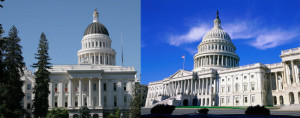 by Rob White
by Rob White
The 2014 Sacramento Metro Chamber Capitol to Capitol Advocacy Trip (Cap-to-Cap) began on Saturday with a day of travel back to Washington DC. Most delegates arrived and began settling in and the remainder arrive today. I will be posting each day on our activities, providing some discussion on what the representatives and teams are working to accomplish.
Representatives from the Davis area include City of Davis Council member Rochelle Swanson, chief innovation officer Rob White, and deputy innovation officer Sarah Worley. There is also representation from Yolo County (Supervisor Don Saylor and several staff), the Cities of Woodland and West Sacramento, UC Davis and the Davis Chamber of Commerce.
This year, the City of Davis is leading the Innovation Team, one of the 14 policy teams on the trip. Davis representatives are also engaged on the Food & Agriculture and Transportation teams. You can review all 48 regional policy papers here.
You might recall that last year Davis and Yolo County representatives came to Washington DC early to do pre-meetings with agencies and elected officials. That effort resulted in some significant progress on several policy areas, including Yolo Freight Rail Relocation and Rural-Urban Connection Strategies. This year those policy discussions have been picked up by the broader regional effort and the need to have a Davis/Yolo centered effort was determined to not be essential to accomplishing our immediate goals.
With respect to Yolo Freight Rail Relocation, you can review the policy paper (written by Woodland representatives and advocated for by West Sacramento team members) at this link.
The description of the effort in the policy paper reads:
“The Yolo Freight Rail Relocation Project includes construction of new rail enabling the relocation of short-line rail traffic in downtown Davis, Woodland and West Sacramento. Completion of the project will allow removal of 19 at-grade crossings and open nearly 100 acres of infill redevelopment property in the three cities, allow removal of the Fremont Trestle to improve the floodwater flow capacity of the Yolo Bypass and increase cargo capacity and operational efficiency at the Port of West Sacramento and within Yolo County. The proposed project’s next phase includes an economic development cost benefit analysis and alignment study establishing the specific route for the new rail. Later stages include an environmental assessment to ensure that the proposed alignment will avoid sensitive areas, complete project design and engineering, full environmental documentation and a comprehensive cost estimate. The project is currently pursuing an Economic Development Administration Grant to fund a cost-benefit analysis for the project.”
Sunday’s activities for delegates include team meetings to go over final schedules and discuss any remaining policy issues. We are still finalizing some of the meetings as we plan for 14 teams to visit elected officials, agencies and advocacy organizations. In the case of Innovation, we are carrying a policy paper that address the topic of Patents, which is timely because there is a lot of discussion about this at the Capitol. It will be interesting to see how this plays out in real time as we are hear advocating our regional views.
The day also includes an evening reception as delegates continue to travel and arrive from the Sacramento Region. One hallmark of the Cap-to-Cap trip continues to be the concentrated opportunity to create and strengthen networks with people that have impact on our local efforts. For Innovation, this includes regional investors and banks, entrepreneur support organizations, education and workforce organizations, and of course technology and startup companies.
Though funding for the trip had not previously been budgeted for the deputy innovation officer to attend, staff made an internal decision to reallocate funding from several other training and conference activities for the innovation efforts. The reallocation covered just the registration fees, local travel and meals, while the deputy innovation officer paid for her own flight and lodging. This is a demonstration of just how significantly staff feel the trip has impact on our daily work activities for the rest of the year. Through establishing regional connections and partnerships, we can bring specific focus to Davis’ programs and activities and create new opportunities. I will be discussing this concept more over the coming days.
In tomorrow’s article, I will go over the advocacy schedule of the Innovation Team to give you an idea of what each of the teams are working on individually and collectively. Though I won’t be able to monitor posts very well to answer questions, I will attempt to do so as much as possible. You can also follow the Davis efforts on Twitter at hashtag #InnovateDavis and my twitter account of @mrobertwhite or the entire delegation at hashtag #Cap2Cap14 and twitter account @Metro_Chamber.


Just curious, what is the total cost for the City for this Cap-Cap trip, including the Deputy’s non airfare and lodging costs? Can we expect to eventually see what cost recovery the City will get from it, beyond what we could have attained without this excursion? Just curious…
I’d like to see more information about how this effects davis. A map of the proposed changes would be helpful.